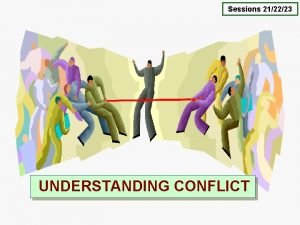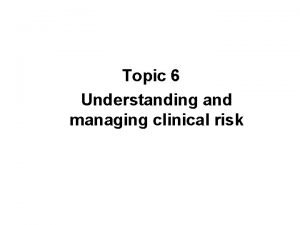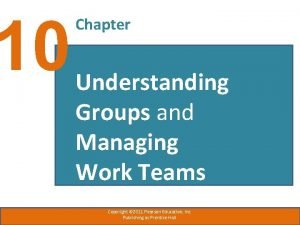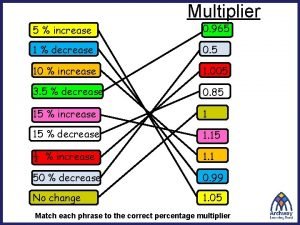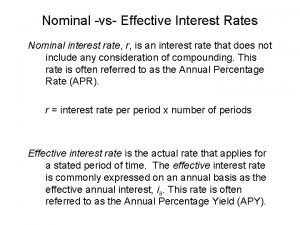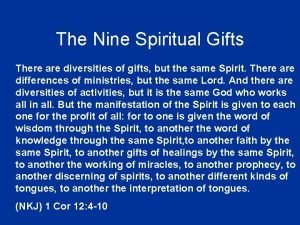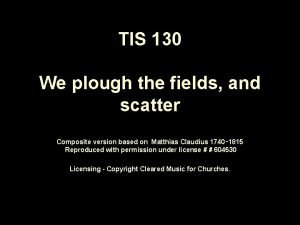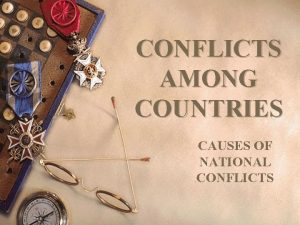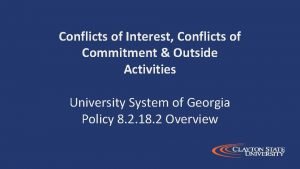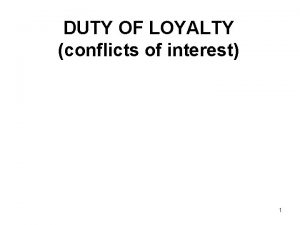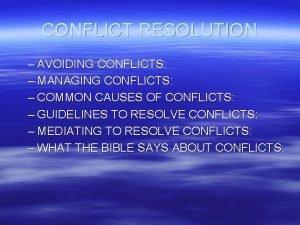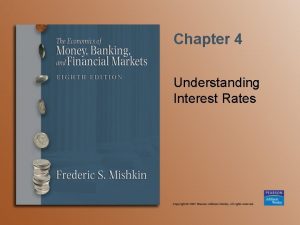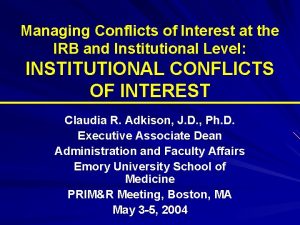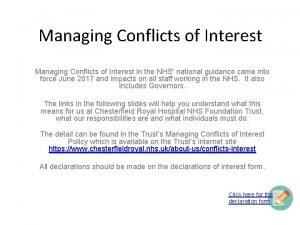Understanding conflicts of interest and managing gifts and
























- Slides: 24


Understanding conflicts of interest and managing gifts and incentives Karty Mayne, Rosewill Consulting Limited Michael Hewes, Financial Markets Authority Alistair Robertson, Minter. Ellison. Rudd. Watts 13 November 2020

Re-cap of Previous Session • New disclosure regulations: practical implementation • Theme: how to implement the new disclosure requirements • Available to watch again on Financial Services Council NZ You. Tube Channel, or on FSC website • Guidance note is available here

Agenda Part 1: • All about conflict of interests • The FMA’s expectations • Why is it so important to identify, manage and disclose them? Part 2: • New disclosure requirements on conflicts, gifts and incentives • Responsibilities for disclosure • Tips on good practice

Your obligations in relation to conflicts of interest • They arise in these key areas: • New duty under the FMCA: In giving advice, an adviser must give priority to C’s interests by taking all reasonable steps to ensure that the advice is not materially influenced by: • the adviser’s own interests; or • the interests of a person connected with the giving of the advice. • New duty under the Code of Professional Conduct: A person who gives financial advice must always act with integrity. Acting with integrity includes avoiding or appropriately managing any conflict of interests • Disclosure

A “conflict of interest” is defined (for the purposes of the Disclosure Regulations) as any interest of the person giving the advice What is a Conflict of Interest? (A), the financial advice provider, or another person connected with the giving of the advice that a reasonable client would expect to, or to be likely to, materially influence the advice given by A. ” Financial Markets Conduct (Regulated Financial Advice Disclosure) Amendment Regulations 2020

An individual conflict-of-interest situation arises when: • the holdings or relationships of an individual (including close family members) • potentially affect the ability to perform duties and responsibilities objectively. Understanding conflicts of interest Actual Apparent Potential Occurs when there is a conflict between the private interests and the official responsibilities of a person in a position of trust, and challenges arise to fulfilling one’s duty impartially. Is a situation in which a reasonable person, with knowledge of the relevant facts, would question the impartiality of the individual in the matter being considered. The appearance of a conflict can cause the same reputational risk as an actual conflict. A scenario that has not yet occurred, but that could occur in certain circumstances in the future. Political Occurs when an individual utilizes business relationships for personal gain.

Conflict of interest risks for financial institutions Personal Financial Institution Nepotism Favouring relatives or personal friends because of their relationship rather than because of their abilities. Self dealing An official who owns or directs an organisation causes it to do business with another organisation that benefits the official. Insider trading Trading corporate stock, bonds, or currency by an insider on the basis of information that is supposed to remain confidential. Gifts The transfer of something with the expectation of receiving something in return. Outside employment Activities that conflict with an employee’s officinal duties or result in an employee’s failure to meet the minimum standards of on-the-job productivity or quality. Bribery/kickbacks The practice of offering something (usually money) in order to gain an illicit advantage. Current or prior relationships Strategic partners and high net worth investors with positions at, and connections to, public issuers. Related Parties Ensure you have a good understanding about what falls within the definition of a related party. Related party transactions are likely to be material to investors and should be disclosed in any disclosure documents. Unjust enrichment A person unfairly gets a benefit by chance, mistake, or another’s misfortune.

“Good governance within insurance firms requires the effective management of conflicts of interest. We need to see much better systems and controls in place to manage the inherent conflicts where advisers or sales staff are offered incentives to sell or replace insurance policies. ”

The FMA’s Expectations • • • Business strategies and incentives are expected to be aligned with customers’ interests. Any incentives or arrangements with related parties are expected to be transparent. Recognising and prioritising customer interests and effectively managing conflicts of interest that arise.

Conflicts of Interest between Adviser Customer Related person Claw-backs and poor conduct Referral relationships Customer Reduced Customer service for different categories based on production Gifts / Incentives Adviser relationship

Conflicts of Interest caused by the relationship with the Product Provider Revenue before client interests Influence, Quote monster & research processes FMA Whistleblowing Subsidized Services e. g. L 5 Incentives / gifts Product Provider Soft dollar incentives Legacy producers Financial advisers Licensee set up Training vs sales focus

How do you demonstrate that you have managed any conflicts of interest • Duties under FMCA and Code don’t prohibit conflicts of interest. • Rather, need to show have been managed appropriately (“must give priority to C’s interests by taking all reasonable steps to ensure that the advice is not materially influenced” by conflicting interests. • Identify and document conflicts of interests that are relevant • Follow a robust advice process designed to ensure that financial advice provided is suitable for the client (and not what is in your interests / FAP’s interests / associates interests) • Maintain appropriate records to demonstrate the process that was followed (the all reasonable steps that were taken) • Undertake periodic reviews of client files to check advice is consistent with client’s best interests.

Why is it so important to identify and manage conflicts of interest? • Under such circumstances the decision-making process can be disrupted or compromised in a manner that affects the integrity or the reliability of the outcomes. • Unmanaged conflicts of interest can undermine trust • Failure to adequately manage conflicts of interest is a breach of the legislation, with potential regulatory consequences.

New Disclosure Requirements

The new disclosure requirements on conflicts If any conflict of interest (other than a commission or other incentive) currently exists or is likely to arise in the future in relation to advice given to the entity's clients; 1) a brief description of the nature and conflict of interest; and 2) a brief explanation of the steps that have been or will be taken to manage each conflict of interest

When must a conflict of interest be disclosed? • Conflicts of interest (excluding commissions and incentives) must be disclosed if a reasonable client would expect it to (or be likely to) materially influence the advice given.

What commissions and incentives must be disclosed? • Commissions or other incentive must be disclosed. A “commission or other incentive” is a commission, benefit or other incentive (whether monetary or non-monetary, and whether direct or indirect) that • is provided to the FAP, adviser or a connected person • is provided as a consequence of the adviser giving the advice or the client acting on the advice e. g. acquiring a financial product, and • a reasonable client would expect to (or to be likely to) materially influence the advice given.

The new disclosure requirements on conflicts If any commission or other incentive will or may be given in relation to the advice the client is seeking or given, for each commission or other incentive, a brief explanation or description of the following: 1) when, or in what circumstances, it will or may be given; 2) who it would be given by and to whom; 3) its amount or value (or how it will be determined) 4) the steps that have been or will be taken to manage conflicts of interest

Responsibilities Who discloses Where the disclosure occurs FAP responsible Publicly available information (internet site) Adviser responsible When nature and scope of advice is known Adviser responsible When advice is given FAP or Adviser When a complaint is received

Gifts and Incentives • What type of gifts should be disclosed? • How do you define an incentive? • What is the threshold? • What is the FMA’s view on soft dollar benefits such as overseas conferences? • Are there occasions when you should decline a gift?

Summary 1. Set the tone from the top 2. Transparency is key 3. Keep sensitive information confidential 4. Promote the right culture 5. No shades of grey

Next Steps Establish and complete your interest register Write your conflicts of interest policy Draft your explanations for the new disclosure

Next Webinar • Session 13 - Get In Shape 2020 Wrap up & Launch of Get In Shape Advice Summit 2021 • Topics Covered: • A summary of the key topics covered in 2020 and focus for 2021 • Announcing the Get In Shape Advice Summit 2021 dates • Friday 27 November, 10 am • Registration details will be sent via FSC emails. Contact fsc@fsc. org. nz to subscribe
 What is a split interest trust
What is a split interest trust Conflict of interest in business
Conflict of interest in business Managing clinical risk
Managing clinical risk Understanding groups and teams
Understanding groups and teams Nominal v. real interest rates
Nominal v. real interest rates Compound interest multiplier
Compound interest multiplier Nominal rate
Nominal rate What are the 12 fruits of the spirit
What are the 12 fruits of the spirit The gifts and fruits of the holy spirit
The gifts and fruits of the holy spirit 9 spiritual gifts
9 spiritual gifts Spiritual gifts romans 12
Spiritual gifts romans 12 Interpreting tongues lesson
Interpreting tongues lesson What are the 7 spiritual gifts
What are the 7 spiritual gifts Allos parakletos meaning
Allos parakletos meaning Receiving god's gifts life in the spirit seminar
Receiving god's gifts life in the spirit seminar Polish baptism traditions
Polish baptism traditions Miss maudie atkinson quotes chapters 4-6
Miss maudie atkinson quotes chapters 4-6 5 love languages meaning
5 love languages meaning What are the 3 wise men's gifts
What are the 3 wise men's gifts Wise men gifts
Wise men gifts Senior night gifts from parents
Senior night gifts from parents Turkish wedding ceremonies
Turkish wedding ceremonies Plough the fields and scatter
Plough the fields and scatter Gerson gifts
Gerson gifts Gifts of the father romans 12
Gifts of the father romans 12

